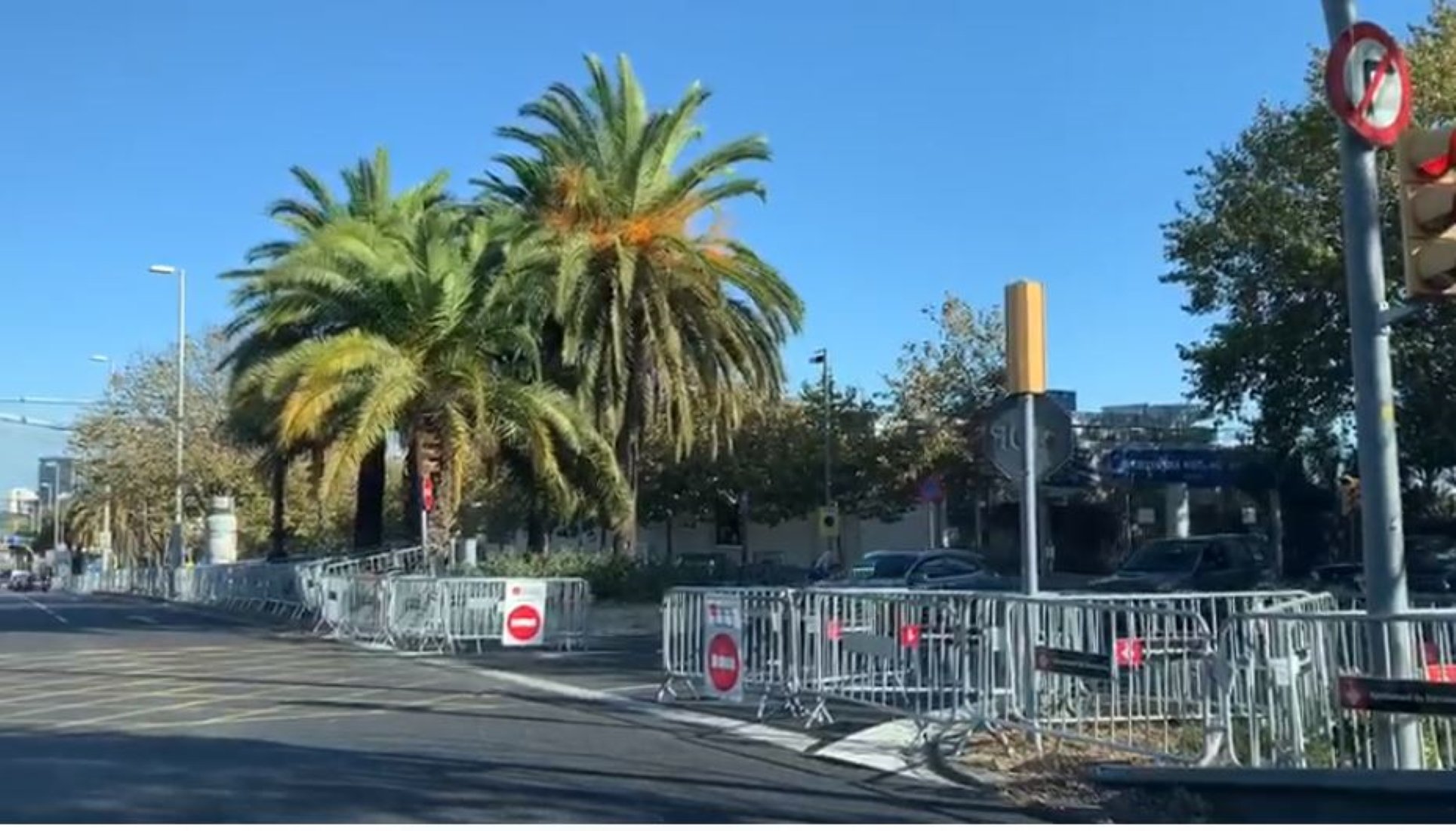The Spanish National Police have set up barriers and made their presence felt on key Barcelona thoroughfare Avinguda Diagonal this Sunday in their efforts to avoid protests against Spain's king Felipe VI and guarantee security.
Access has been cut to the lanes of the city's major traffic artery which lead towards the Palau de Congressos conference centre - the venue for Monday's award ceremony for the Fundació Princesa de Girona, which the Spanish king is to present - and the Hotel Juan Carlos I, where according to some sources, the royal family is to spend the night.
In addition to the measures on the Diagonal, security has also been increased around the site of the Hotel Juan Carlos I and extra checkpoints have been set up at the entry points.
As many as five different groups have called for protest actions against the visit of the Spanish monarch. The first of these, organised by the Committees for the Defence of the Republic (CDRs), is to take place this Sunday evening: a call for a pots-and-pans protest outside the hotel at 8.30pm with the slogan "We won't let you sleep!"
👑 El rei espanyol arriba abans a Barcelona perquè li fem por. No et deixarem dormir!
— CDR Catalunya (@CDRCatOficial) November 2, 2019
🔊 Cassolada contra el repressor i per la República!
🗓 Diumenge, 3 novembre.
🕣 20.30h
📌 Hotel Juan Carlos
I dilluns #4N al Palau de Congressos 🚫👑#RevoltaPopular 🔥#CDRenXarxa pic.twitter.com/SLocS6xUVY
Several days ago, the youth wing of the pro-independence radical left, Arran, called a protest for Monday afternoon to coincide with the awards ceremony.
🔴 ATENCIÓ 🔴 El pròxim dilluns tothom al Palau de Congressos de Catalunya per bloquejar la visita de Felip VI. ➡️ Hem de ser moltes per demostrar que no tenim #NiReiNiPor! ✌️ pic.twitter.com/sqg1szCvix
— Arran #NoClaudiquem (@Arran_jovent) October 31, 2019
Other pro-independence, anti-repression platforms such as Picnic for the Republic, the Plaça Universitat protest camp collective and Anonymous Catalonia have also given their support to the protest and called on the public to take part.
⚠️ AVANCEM LA CONVOCATÒRIA D'AQUESTA TARDA! ⚠️
— Acampada Plaça Universitat #Generació14O (@AcampadaUni) November 3, 2019
👉 A les 19:30 sortim des de Plaça Universitat direcció Hotel Rey Juan Carlos I!
🚫 A l'@AcampadaUni ho tenim clar, NO TENIM REI!#Generació14O https://t.co/s40LSQ2VgM pic.twitter.com/aXqtDWtneQ
@PicnicxRep ens sumem oficialment a la convocatòria de @CDRCatOficial d'avui.
— PicnicxRepública (@PicnicxRep) November 3, 2019
Ens veiem aquest vespre a l'hotel Juan Carlos!#JuntsSomImparables https://t.co/QMebujayE3
The Princesa de Girona awards are being held in Barcelona this year following the refusal of the Girona city council to host the event in 2018, part of the growing separation between the Catalan authorities and the Spanish royal house which has accelerated since the October 2017 referendum and Felipe VI's controversial speech on the issue.
Security measures at antiterrorism level 4
Spain's interior ministry has also reported that it has strengthened the security measures being applied to the current level 4 anti-terrorism level in the final approach to the 10th November Spanish general election. On this occasion, said a ministry spokesperson, there will be a "special intensity" of reinforcement for the measures, given the possibility of "acts of vandalism or riots in Catalonia".
The reinforcement, which was imposed since last Friday and is to continue until 2pm on Monday 11th, consists of the "strengthening of security measures and intelligence capabilities" by the state's main police forces: the National Police, Civil Guard, Mossos d'Esquadra, the Basque Country force Ertzaintza, and Navarra's Foral Police.
This will be applied especially in public spaces and transport means, at leisure or recreational events with a high concentration of people and in those strategic places which are "essential" for the normal functioning of public activity, especially those related to electoral processes.
According to the Spanish ministry led by Fernando Grande-Marlaska, this reinforcement is similar to that which was used during Spain's first general election this year, on April 28th, and is intended to complement the measures already planned in the plan for a level 4 antiterrorist alert.

